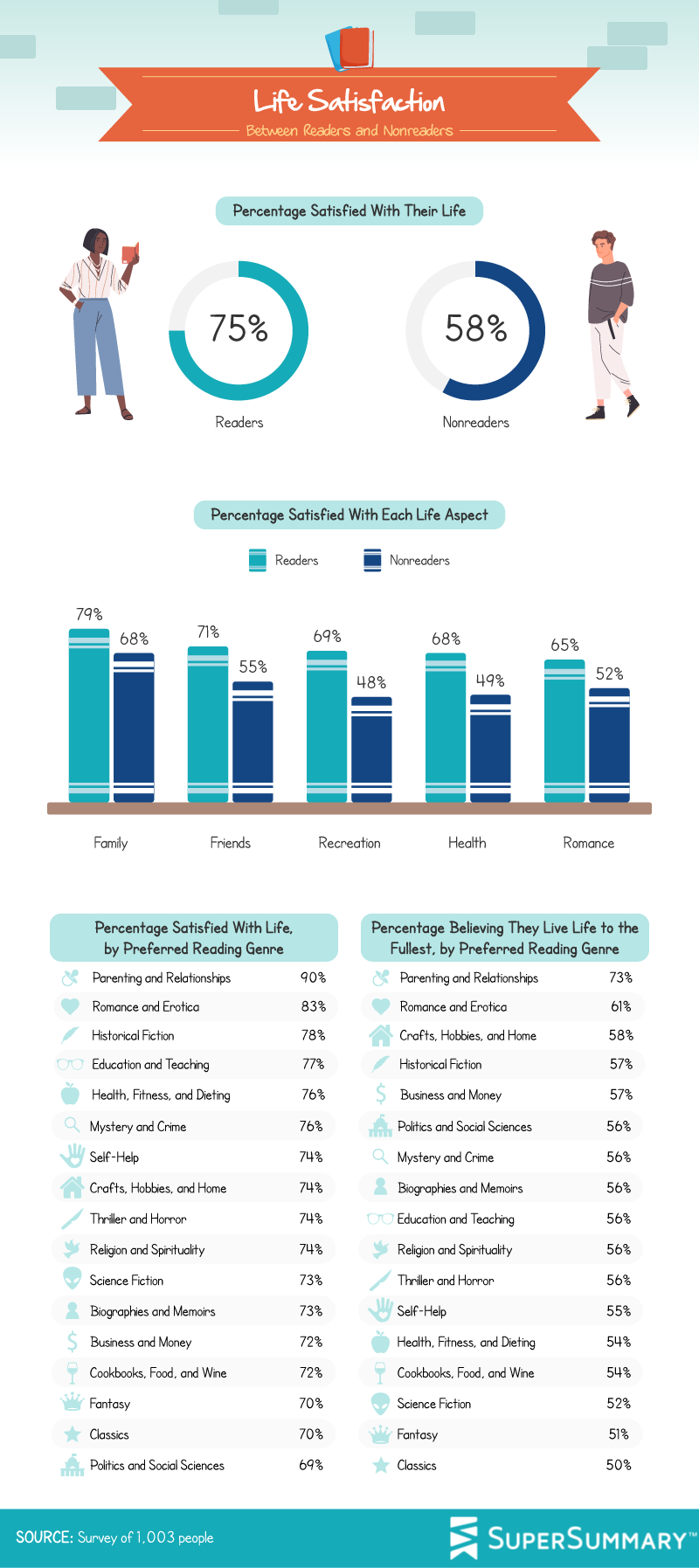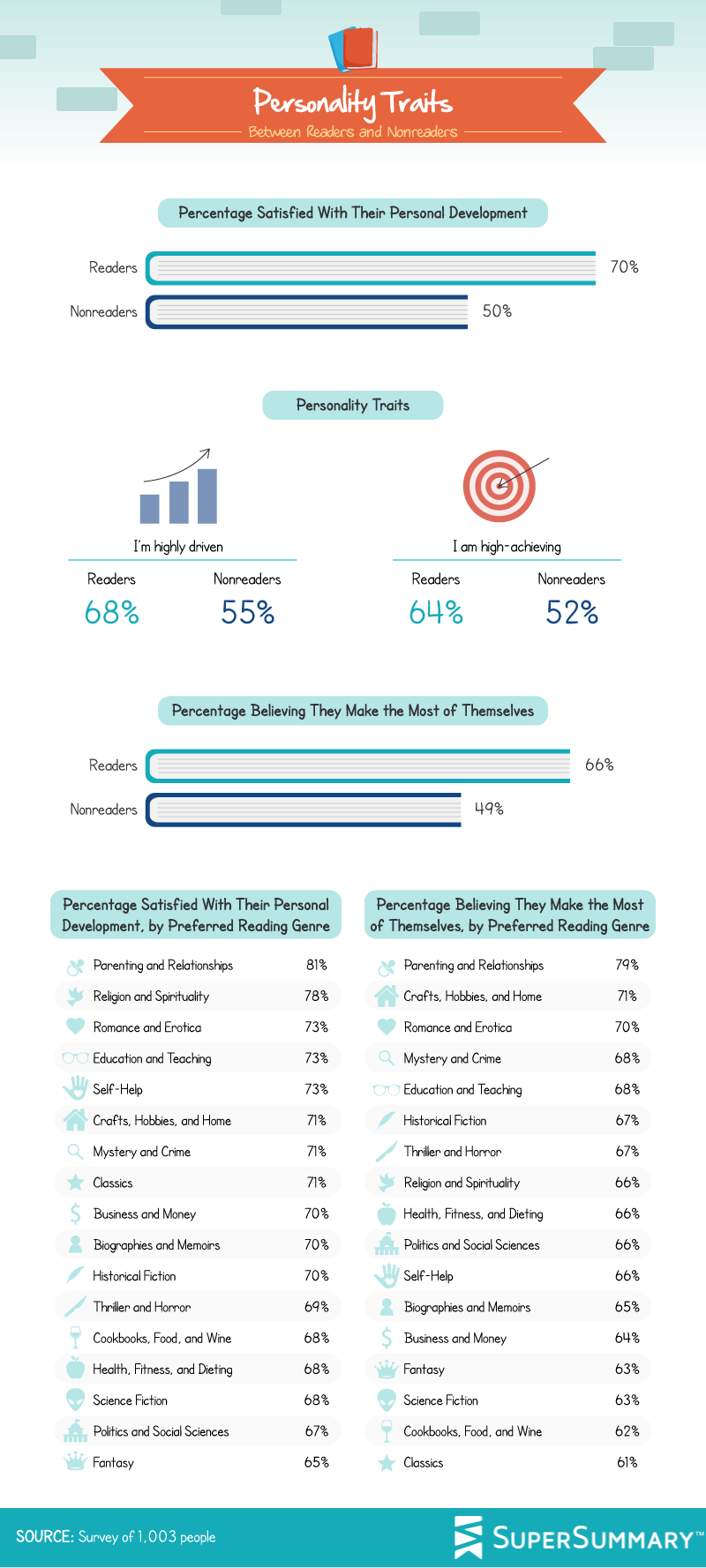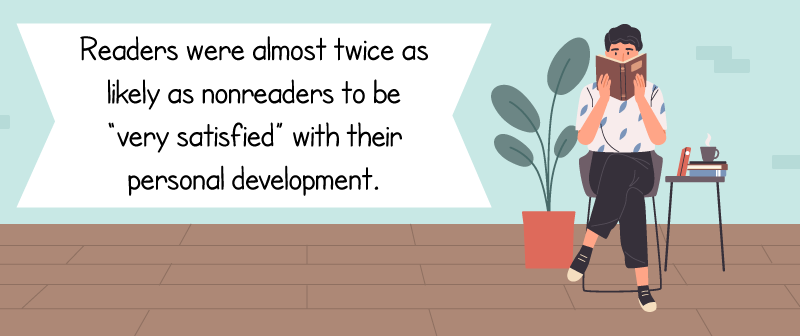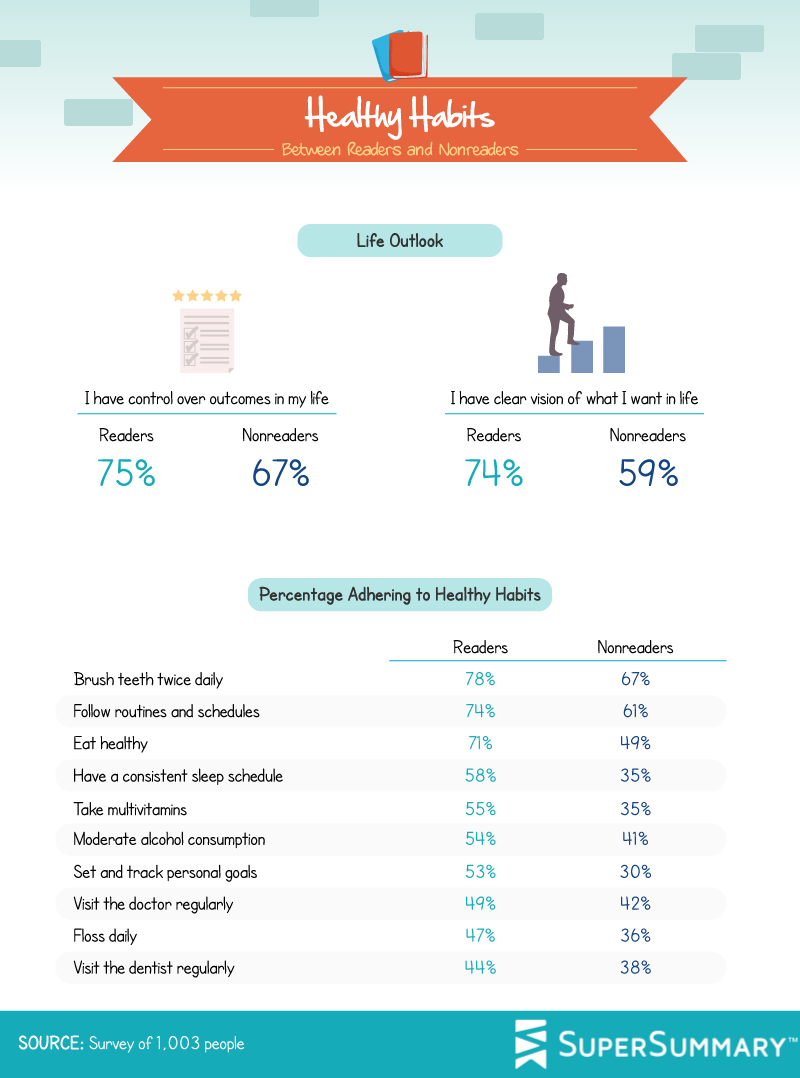are readers more successful?
Exploring Reading's Effect on Life Aspects
 There’s no doubt about it: Reading is good for us. Whether it’s Dr. Seuss or the Game of Thrones series, diving into a story does more than just ignite imagination and transport us to an alternate reality. Research has shown that parents who dedicate time to read with their children (even those as young as 6 months old) can expect it to strengthen literacy skills for years to come, increase scores on intelligence tests, and even lead to better jobs in the future. But the benefits aren’t confined to just childhood.
There’s no doubt about it: Reading is good for us. Whether it’s Dr. Seuss or the Game of Thrones series, diving into a story does more than just ignite imagination and transport us to an alternate reality. Research has shown that parents who dedicate time to read with their children (even those as young as 6 months old) can expect it to strengthen literacy skills for years to come, increase scores on intelligence tests, and even lead to better jobs in the future. But the benefits aren’t confined to just childhood.
Research shows adults who take the time to read are not only more open-minded and creative but also live longer. In addition to these benefits, how else does reading make people more successful in life? To learn how reading affects life satisfaction, personal development, and financial well-being, we surveyed over 1,000 people and compared the responses from readers and nonreaders.
A bit of housekeeping before we start: Respondents categorized as “readers” were those who read regularly, and respondents categorized as “nonreaders” were those who rarely or never read. Keep reading to see how cracking open a book can benefit your life.
Satisfaction Guaranteed

The pursuit of happiness may be ingrained in our country’s fabric, but American happiness has been decreasing for some time now. And while opening a book and getting lost in the pages isn’t always a cure-all, readers were significantly more satisfied with their lives compared to nonreaders. While 58% of those who don’t read cited being satisfied, 75% of readers said the same. Typically, people find happiness through a mixture of life aspects like health, partners, careers, and friends, but both readers and nonreaders were most satisfied with their family life. However, across all life aspects, over 60% of readers were satisfied, while less than half of nonreaders found satisfaction in their recreation and health.

While life satisfaction has decreased across America, science fiction and fantasy book sales have doubled in the last decade. While our research did not identify a difference in life satisfaction between fiction and nonfiction readers, we did learn that various genres were correlated with varying levels of life satisfaction. Readers of parenting and relationships books were the most likely to report being satisfied with their lives and the most likely to believe they live life to the fullest. The romance and erotica genre closely followed for each of those categories, while fantasy surprisingly fell to the bottom of both lists. Rather than one genre reigning supreme, reading overall seems to be the key – at least half of readers across all genres said they were satisfied and lived life to the fullest.
Pages of Personality

Personal development is a lifelong process. Most of the focus on growth may revolve around basic needs and relationships (think Maslow’s hierarchy), but reading also plays a major role. Compared to just 50% of nonreaders, 70% of readers said they were satisfied with their personal development. Readers were also significantly more likely to say they were highly driven, high-achieving, and more likely to reach their goals.
The link between reading and satisfaction may come down to introspection, evolution, and confidence. Reading often allows people to see themselves in characters or receive advice from experts – in turn, helping them improve and become the best versions of themselves. In fact, 66% of readers said they believed they make the most of themselves, while only 49% of nonreaders could attest to the same.

But it isn’t just self-help books that lead to introspection and improvement. Parenting and relationships readers were the most likely to report that they are satisfied with their personal development and make the most of themselves. On the other hand, 73% of self-help readers said they were satisfied with their personal development, while 66% said they make the most of themselves.
It’s a Lifestyle

Reading may positively impact intelligence scores and memory – after all, reading is the perfect exercise for your brain – but the health benefits don’t stop at brainpower. Readers were not only more likely to have positive outlooks on life, reporting they had control over outcomes and a clear vision of what they wanted out of life, but were also more likely to adhere to every healthy habit provided. Compared to 67% of nonreaders, nearly 80% of readers said they brush their teeth daily. Similarly, 74% of readers said they follow routines and schedules, while only 61% of nonreaders said the same.
However, there were greater differences when it came to eating healthy and adhering to a consistent sleep schedule. While just under half of nonreaders reported eating healthy, 71% of readers reported following a healthy diet. And compared to 58% of readers, only 35% of nonreaders said they keep a consistent sleep schedule. Adhering to healthy habits is often difficult for most people, but readers may be more likely to do so because they hold themselves in high esteem.
Financial Literacy

Some of the most successful people in the world – from Oprah and Bill Gates to Phil Knight and Elon Musk – credit much of their success to books. While they have different accomplishments, they view books in the same way: a path toward learning. And it’s that path that likely makes readers more successful in their careers and finances.
Compared to 77% of nonreaders, 86% of readers were employed full time and brought in an average of $5,000 more annually. Readers not only have higher salaries but also save or invest significantly more than their nonreading counterparts. While nonreaders had a median amount of just $500 saved or invested, readers had $4,000; that’s eight times as much!
Of course, bringing in and saving more money is bound to give people better financial security. Forty-four percent of readers said they felt financially secure, while just 36% of nonreaders said the same. Readers were also more likely than nonreaders to report feeling financially stable and pay bills in full and on time. But just like some of the most successful people, the link between books and success seems to be about learning and knowledge: Readers were more likely to be knowledgeable about personal finances, banking, economics, and the stock market.
The knowledge they presumably learned from reading, in turn, made them more confident in financial management: 87% of readers said they were comfortable handling financial matters, while 86% said they monitor and track personal finances, with 77% and 75% of nonreaders saying the same, respectively.
While reading seems to boost people’s financial success, specific reading genres may help as well. Readers of parenting and relationships books again topped the chart, bringing in a median income of nearly $50,000 annually. Interestingly, those choosing to read business and money books also earned more money than most other genre readers, who bring in a median of $47,000 a year. But readers of the business and money genre save more than any other type of reader, with an average of $16,000 saved or invested.
Read Between the Lines
There are plenty of books claiming to contain the secret to happiness and success, but the biggest secret might just be opening a book in the first place. As our study found, it’s the act of reading that correlates happier, healthier, and more successful lives. From personal satisfaction to better financial management, books do so much more than open doors to different realities.
And learning doesn’t stop when the story ends. Understanding the underlying meaning of a story, the motivations of its characters, and the richness of its themes and symbols is vital to reaping the full rewards of reading. At SuperSummary, our in-depth study guides are written by experienced teachers, professors, and scholars so that students and recreational readers alike can get the most out of the books they read. To learn more, visit us online today.
Methodology and Limitations
We surveyed 1,003 people using the Amazon Mechanical Turk service. To ensure that respondents took our survey seriously, all respondents were required to identify and correctly answer an attention-check question. To classify respondents as “readers” and “nonreaders,” we relied on respondents’ self-reported reading habits. Respondents who read regularly were classified as “readers,” and respondents who rarely or never read were classified as “nonreaders.” Our margin of error was 3% with a 95% confidence interval.
In many cases, questions and responses were rephrased for clarity or brevity. These data rely on self-reporting, and strict statistical testing has not been performed on these findings. Potential issues with self-reported data include but are not limited to exaggeration, selective memory, and attribution errors on the part of respondents.
Sources
- https://www.rd.com/article/benefits-of-reading-books/
- https://www.inc.com/christina-desmarais/why-reading-books-should-be-your-priority-according-to-science.html
- https://www.latimes.com/science/sciencenow/la-sci-sn-americans-less-happy-20190323-story.html
- https://www.pewresearch.org/fact-tank/2018/11/20/americans-who-find-meaning-in-these-four-areas-have-higher-life-satisfaction/
- https://www.forbes.com/sites/adamrowe1/2018/06/19/science-fiction-and-fantasy-book-sales-have-doubled-since-2010/#77d3be062edf
- https://www.simplypsychology.org/maslow.html
- https://www.cnbc.com/2017/05/28/how-reading-fiction-makes-you-smarter.html
- https://www.businessinsider.com/what-successful-people-read-2017-7#phil-knight-7
Fair Use Statement
Is there an avid reader in your life who’d love to learn how their hobby benefits them? Feel free to share our study with them. The graphics and content found here are available for noncommercial reuse. Just make sure you link back to this page so that the authors receive proper credit.